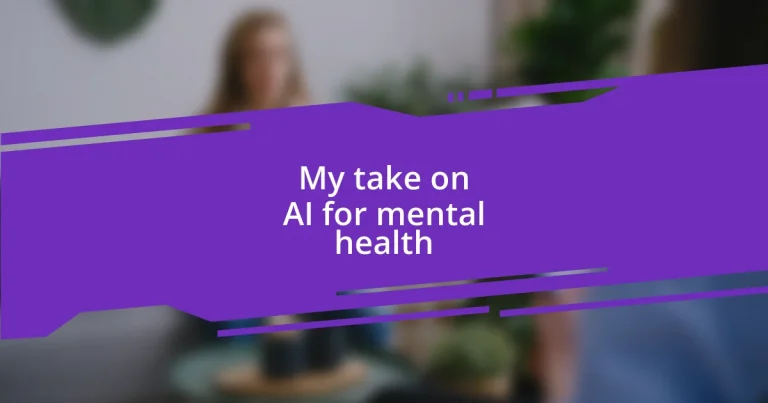Key takeaways:
- AI enhances mental health care by providing personalized treatment, 24/7 accessibility, and scalable solutions, bridging communication gaps between therapists and patients.
- Ethical concerns include data privacy, informed consent, potential biases, and the challenge of AI understanding complex human emotions.
- Patient experiences with AI support reveal both appreciation for immediate help and skepticism regarding the limits of AI in replacing genuine human connection.
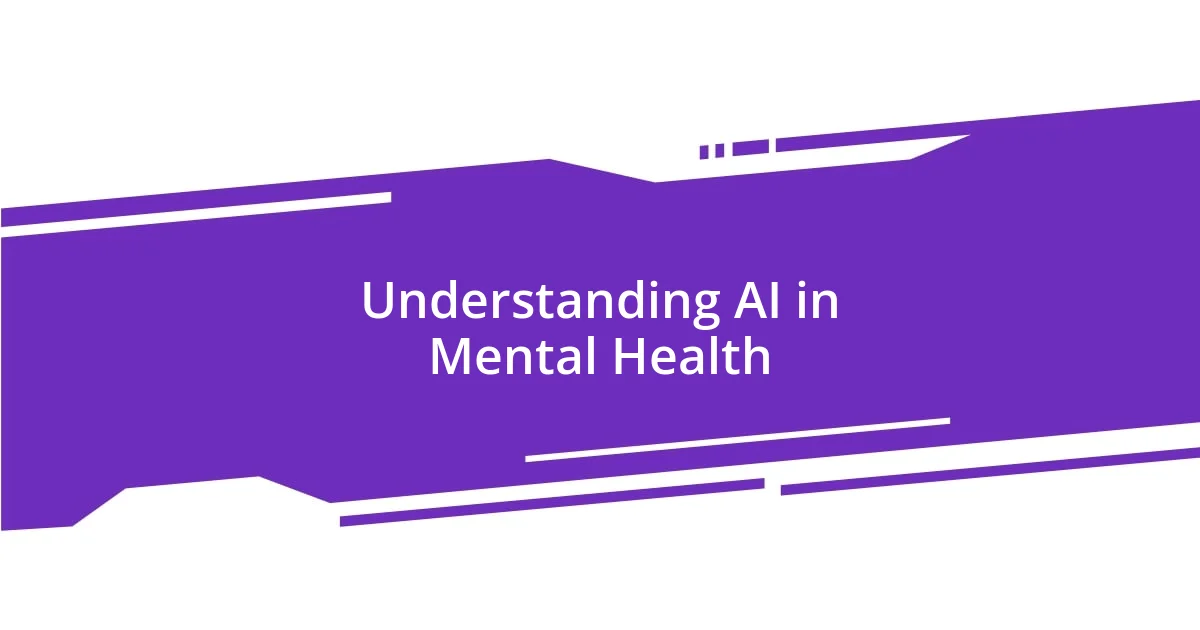
Understanding AI in Mental Health
AI is reshaping the landscape of mental health treatment in ways we’re only beginning to understand. Imagine a world where personalized therapy is accessible at the click of a button—this isn’t just a dream; it’s becoming a reality. From chatbots offering immediate support to algorithms analyzing behavioral patterns, AI has the potential to provide insights that even seasoned professionals might overlook.
Reflecting on my own experiences with anxiety, I can appreciate how overwhelming it can feel to seek help. If AI tools were available at that time, I wonder how different my journey would have been. Would a simple app have made it easier for me to connect with support, track my mood, or even set achievable goals?
Moreover, the emotional nuance of mental health cannot be underestimated. While AI can analyze data and deliver basic therapeutic techniques, can it truly grasp the depth of human emotions? This question lingers in my mind, reminding me that while technology can enhance care, it will never fully replace the empathetic connection between a therapist and a client.
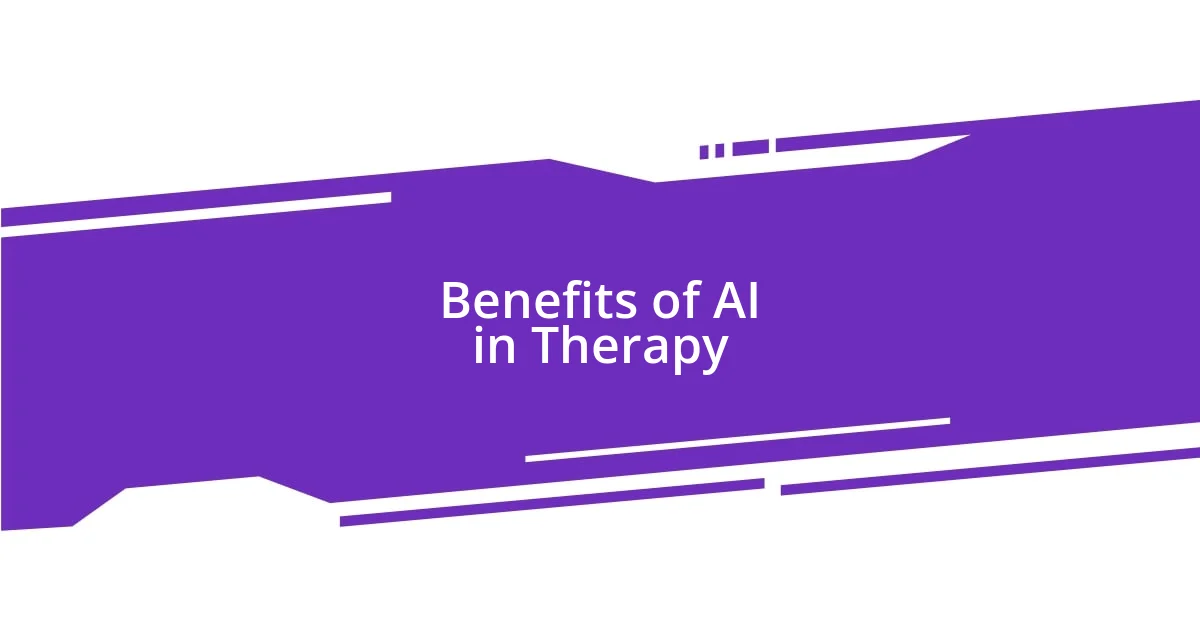
Benefits of AI in Therapy
AI is providing therapists with insightful data that can enhance treatment strategies. Imagine a therapist receiving real-time updates on a patient’s mood changes through an app—they can tailor sessions in ways that truly resonate. This personalized approach can transform how therapy is delivered, bridging gaps in communication. I remember a time when I had to wait two weeks for my next session. An update like that could have made all the difference—keeping my therapist in the loop and ensuring my needs were met.
Another significant benefit is the accessibility AI brings to therapy. With chatbots available 24/7, individuals no longer have to wait for office hours or appointments to find some relief. Personally, I can see how valuable it would have been to have someone—albeit a chatbot—available to chat when I felt those heavy waves of anxiety crashing in late at night. Having immediate support could empower people to seek help without the barriers typically associated with traditional therapy.
Lastly, the scalability of AI solutions is something I find incredibly promising. Unlike human therapists, who can only work with a limited number of patients, AI can reach thousands at once, helping to break down barriers in mental health care. As someone who deeply values connection, I often think about the potential outreach this brings. If we can ensure that more people have access to the tools they need, imagine the lives we could touch and the stigma we could reduce.
| Benefit | Insight |
|---|---|
| Personalized Treatment | AI can provide real-time data to therapists, tailoring sessions to individual needs. |
| Accessibility | Chatbots offer 24/7 support, reducing the wait time for help. |
| Scalability | AI solutions can reach a broader audience, expanding access to mental health tools. |
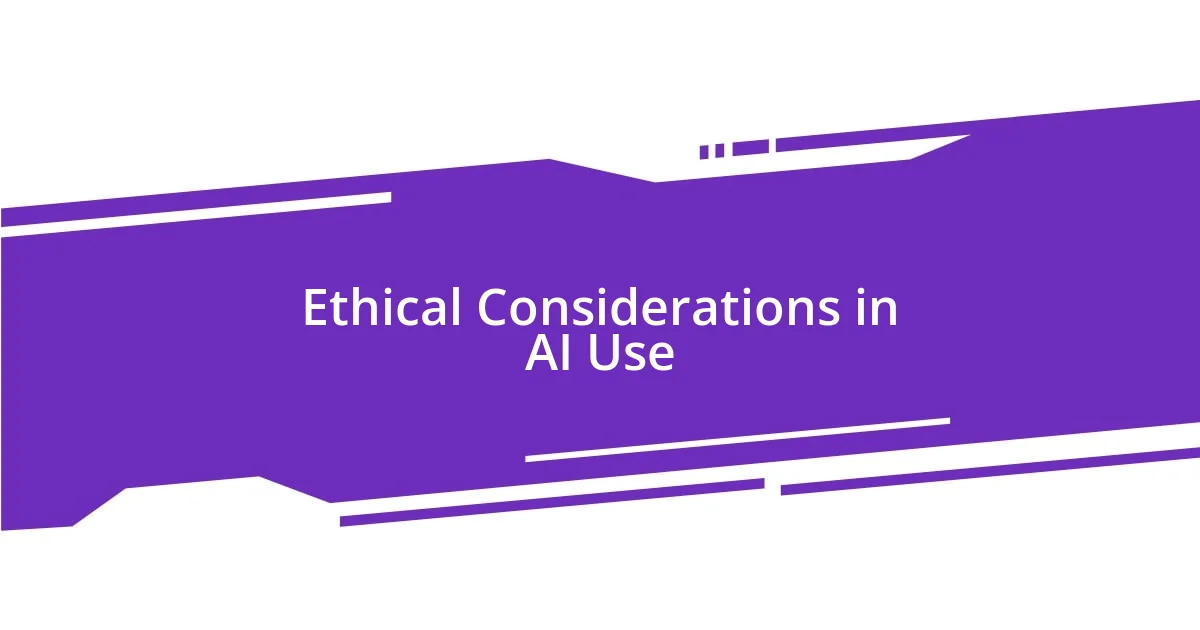
Ethical Considerations in AI Use
When it comes to ethical considerations in the use of AI for mental health, the conversation can get pretty complex. One fundamental issue is privacy—how can we ensure that sensitive personal data remains protected? I’ve always felt a bit anxious about sharing my thoughts and feelings, and the idea of an AI handling that data gives me pause. If I were to seek help through an app, I would want to know exactly what happens to my information, who can access it, and how it’s being used.
In addition to privacy concerns, there’s the risk of over-reliance on technology. While I appreciate the convenience of digital support, I sometimes wonder if it could potentially lead to a disconnect from human interaction.
Here are some key ethical considerations to ponder:
- Data Privacy: Organizations must prioritize protecting users’ confidential information.
- Informed Consent: Clients should be fully aware of how their data will be used and what to expect from AI interactions.
- Bias: AI tools often rely on existing data, which can inadvertently perpetuate biases in treatment.
- Emotional Nuance: AI may struggle to accurately interpret complex human emotions, leading to oversimplified responses.
Navigating these ethical landscapes is crucial as we integrate AI into mental health care. It’s a delicate balance between leveraging technological advancements and ensuring the safety and well-being of those seeking help.
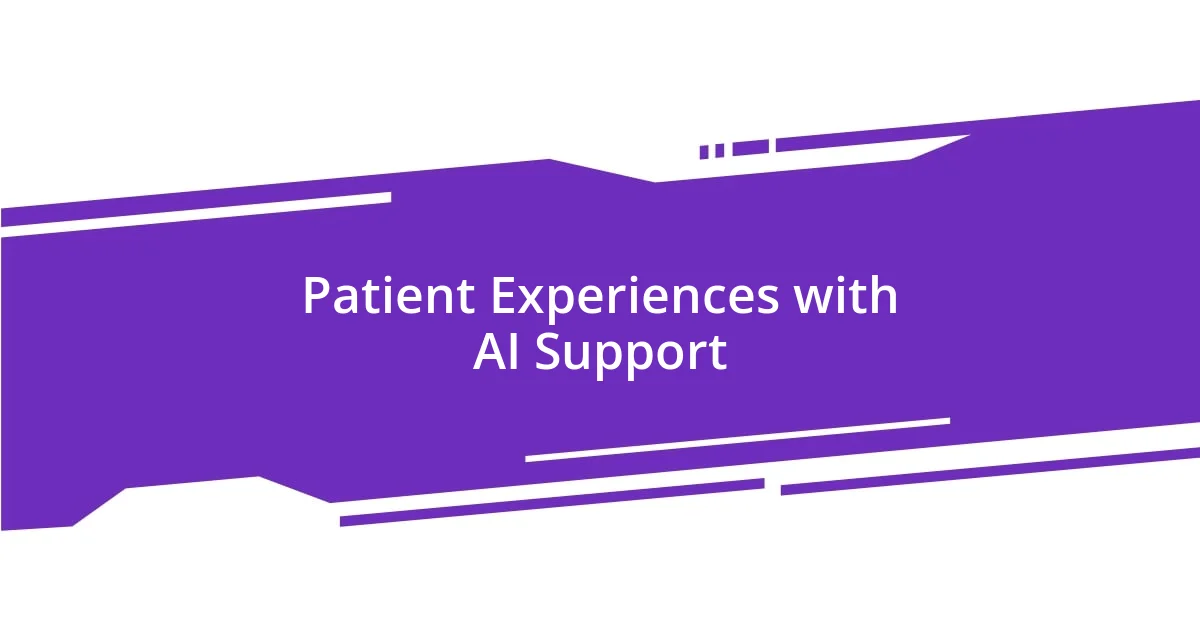
Patient Experiences with AI Support
While there’s plenty of talk about how AI can assist in therapy, I’ve often found myself curious about what real users feel about these interactions. From the experiences shared with me, many patients appreciate having AI companions to express their thoughts when human support isn’t readily available. I remember hearing from one person who found solace in a chatbot during a panic attack. They explained how pouring out their feelings instantly made them feel lighter, as if the weight was lifted simply by articulating their struggles, even to a machine.
However, I also sense a mix of skepticism in some discussions. Many individuals wonder how effective an algorithm can truly be when navigating the complexities of mental health. One friend shared that, while they valued the AI for its availability, they felt there were moments—like during intense grief—when only genuine human empathy could truly resonate. It’s a poignant reminder of the delicate balance between technology and authentic human connection.
Additionally, there’s the notion of becoming too reliant on these AI tools for emotional regulation. I often find myself asking: is there a risk in turning to a chatbot instead of confiding in someone we trust? A family member once mentioned they started depending on their AI therapist for daily check-ins, but eventually realized they missed the deep conversations they used to have with friends. It made me reflect on the importance of blending technology with our existing support systems to ensure we’re supported holistically.
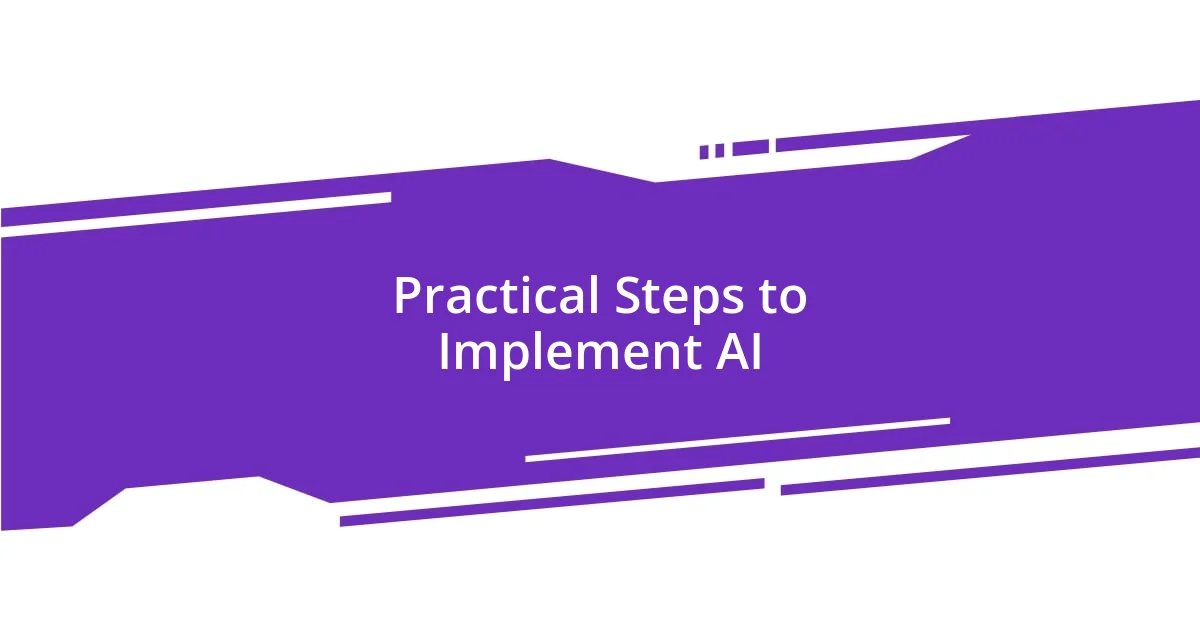
Practical Steps to Implement AI
To implement AI effectively in mental health care, the first step is selecting the right tools. I remember when I explored different AI platforms for myself, and it was overwhelming. There are so many options, each claiming to be the best. It’s crucial to evaluate how these tools prioritize user privacy and consent. After all, knowing your data is safeguarded can instantly put your mind at ease.
Next, training staff to integrate AI into their practice is essential. During my time in workshops, I noticed that many practitioners were hesitant about using technology in therapy. They feared losing the personal touch. But once they learned how to use AI as a complementary tool rather than a replacement, they started to see the potential benefits. It’s all about finding that synergy between human intuition and AI insights.
Finally, monitoring and evaluating the effectiveness of AI tools is vital. I often think about how we regularly check in on our mental state; shouldn’t we do the same with the technology we use? By collecting feedback from users and caregivers, we can adapt and refine AI systems to better serve our emotional needs. This iterative process not only enhances the user experience but also fosters trust in AI’s role in mental health care.












